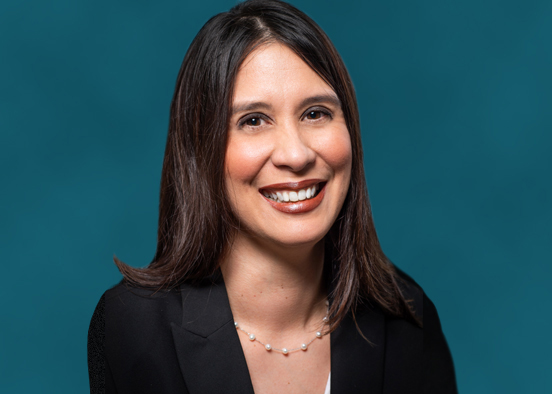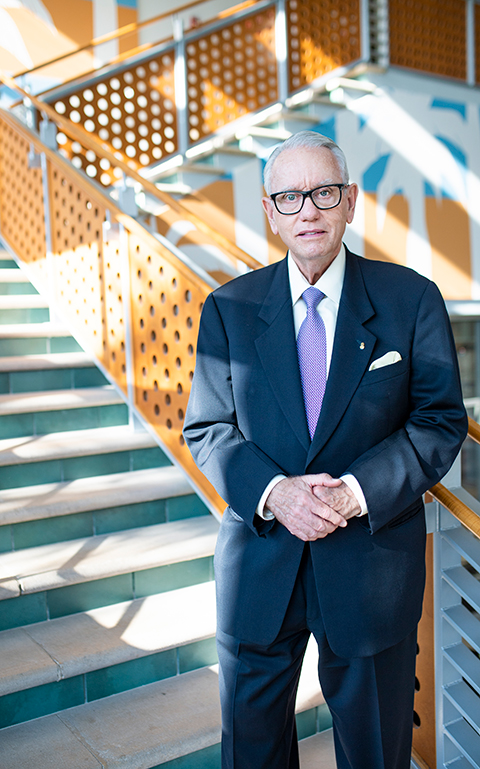By spring 2022, graduates of FGCU’s School of Resort & Hospitality Management will enter the workforce with added assets they can apply in a wider range of career paths, thanks to the school’s move to the Lutgert College of Business.
As the hospitality degree program transitions into a business degree at the end of the fall semester, students will take additional required courses in economics, finance, accounting, supply-chain management and other subjects that prepare them to excel in business settings besides hospitality. With new concentrations offered for the bachelor’s in resort and hospitality administration, undergraduates still will have the opportunity to gain specialized knowledge in one of four areas of concentration.

While those changes were in the works before Catherine Curtis joined FGCU in January as director of the School of Resort & Hospitality Management and associate professor, she speaks eagerly of seeing them through as she steers the next phase of the school’s evolution. Especially considering she has a world-class hospitality guru on board as an executive-in-residence to help during the transition: Ed Staros of Naples, recently retired after 48 years in the industry — most of them as a Ritz-Carlton executive. (Watch for an upcoming profile of Staros on FGCU360.com.)
“We actually have an industry legend with us,” Curtis enthuses. “An executive-in-residence is not uncommon at universities, but the caliber of who we have is unparalleled.”
The School of Resort & Hospitality Management was the first hospitality program in the State University System of Florida accredited through the Accreditation Commission for Programs in Hospitality Administration. As part of Lutgert College, it has the added value of being accredited through the Association to Advance Collegiate Schools of Business.
“I think out graduates will have a better competitive advantage when they get out in the workforce because they’re coming from a school that has dual accreditation,” Curtis says. “Not too many schools have both. That’s an accomplishment we should be really proud of.”
Having a stronger, broader foundation in business knowledge will be especially beneficial to grads still considering their professional options and those who are competing for jobs in the hospitality industry as it slowly recovers from catastrophic COVID-19 pandemic losses, cutbacks and layoffs, according to Staros. The longtime vice president and general manager of two Ritz-Carlton properties in Naples, Staros was actively involved with the development of FGCU’s program from the beginning and still serves on advisory boards in the RHM school and in Lutgert College.

From his role as a mentor, Staros knows some students approaching graduation are weighing the commitment of extra time and money to stay an extra semester and meet the business degree requirements rather than finish this December with the hospitality degree. But with the way the job market stands, furloughed hospitality workers are likely to be considered ahead of new graduates with little or no experience as employers rebuild staffs to pre-pandemic levels, Staros believes. He encourages his mentees to consider whether it might be more advantageous to stay in school long enough to earn the enhanced degree instead of risking six months to a year applying for jobs in a flooded market.
“There couldn’t be a better time for FGCU to be converting this to the business school than today. A business degree really should be the standard in any hospitality program,” Staros says. “If you have a business degree, you can go into finance, risk management, insurance, real estate — all these different directions.”
Staros determined in fourth grade that he wanted to be a hotelier when he grew up and earned a hospitality degree from Florida State University that was 50-50 hospitality and business courses. Every principle or skill he learned in a business-related class, he maintains, was essential to the success he achieved.
Not everyone is as decisive. Or when faced with the long hours and hard work of hotel or restaurant management, graduates who enter the workforce may decide the industry is not for them.
The curricular changes will better prepare them to move into a different line of business, says Curtis, who came to FGCU with 15 years of experience in hospitality as well as a decade teaching at Oklahoma State University’s School of Hospitality and Tourism Management. She earned her master’s and Ph.D. in hospitality management at the University of Central Florida.
Curtis’ resume includes positions with corporate lodging giants such as Hilton, Omni and Starwood as well independent restaurant operations. Her experience is a mixture of both front- and back-of-the-house positions, including accounting and auditing, multi-unit management, beverage management, sales, service, production, wine programs and bartending.
She looks forward to teaching the school’s wine tasting and merchandising course next fall, especially as classes return to a more typical interactive format. That’s just one of many experiential learning opportunities available in what’s now called the resort and hospitality administration degree. The new concentrations are: event management; restaurant and club management; food and beverage management; and lodging management.
“I like the fact that, especially during normal times, we’re very into experiential education here,” Curtis says. “Our faculty all have real industry experience. They can talk the talk and walk the walk. We also are very lucky to have so many industry giants living and working in this area, and they very generous with their time to speak to our students and talk to them about their careers. We are looking forward to providing more opportunities as restrictions are lifted.”
Of course, FGCU’s location in an area where tourism and hospitality are the primary economic force also opens many doors for community partnerships with events like Wanderlust, internship opportunities for undergraduates, and career prospects that allow graduates to turn their knowledge and experience into assets for the regional economy. The school has a 100% placement rate for interns. Curtis states, “Here, this place is a destination within itself. That’s one of the wonderful things about this area. You’re living in tourist destination.”
- Read more: Course offers a taste of artisanal food culture and production